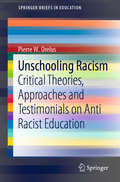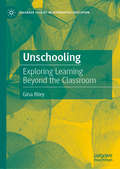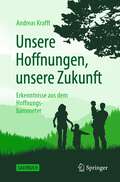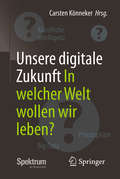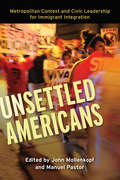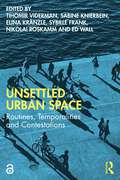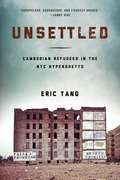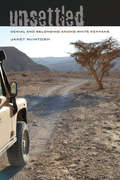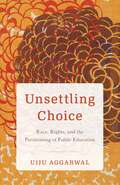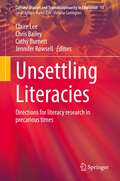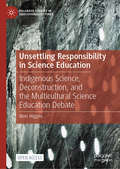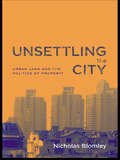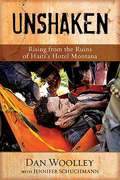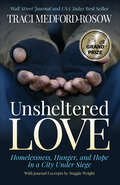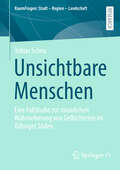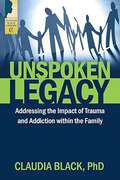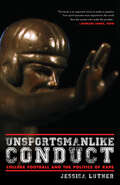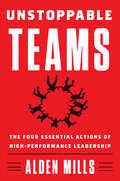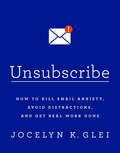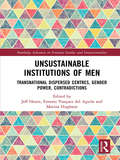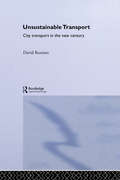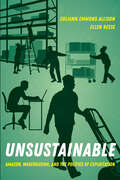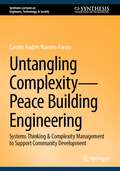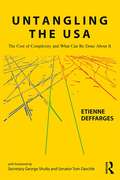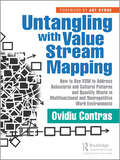- Table View
- List View
Unschooling Racism: Critical Theories, Approaches and Testimonials on Anti Racist Education (SpringerBriefs in Education)
by Pierre W. OrelusThis book draws on critical race theories and teachers’ testimonials grounded in 20 years of teaching experiences to reveal the ways in which racial and cultural biases are embedded in school curricula, and both their intended and unintended consequences on the learning and well being of students of color. More specifically, this book examines how these biases have played a significant role in the mis-education, misrepresentation, and marginalization of African American, Native American, Latino and Asian students. But the analysis doesn’t stop there. The author goes beyond the school walls to underscore how systemic racism, paired with colonialism, has impacted the lives of racially marginalized groups in both the United States and developing countries. This book uncovers these injustices and proposes alternative ways in which racism can be unschooled.
Unschooling: Exploring Learning Beyond the Classroom (Palgrave Studies in Alternative Education)
by Gina RileyThis book explores the history of the unschooling movement and the forces shaping the trajectory of the movement in current times. As an increasing number of families choose to unschool, it becomes important to further study this philosophical and educational movement. It is also essential to ascribe theory to the movement, to gain greater understanding of its workings as well as to increase the legitimacy of unschooling itself. In this book, Riley provides a useful overview of the unschooling movement, grounding her study in the choices and challenges facing families as they consider different paths towards educating their children outside of traditional school systems.
Unsere Hoffnungen, unsere Zukunft: Erkenntnisse aus dem Hoffnungsbarometer
by Andreas KrafftWie können wir Krisen bewältigen und die gemeinsame Zukunft gestalten?Seit Beginn der Corona-Pandemie werden wir alle vor eine immense Belastungsprobe gestellt. Dabei zeigt sich, wie die Menschheit mit solchen Situationen erfolgreich und konstruktiv umgehen und das Beste daraus machen kann. Und wir lernen, dass die Zukunft nicht etwas ist, was uns widerfährt, sondern wir diese aktiv und konstruktiv gestalten können. Grundvoraussetzung dafür ist eine Haltung der Offenheit, der gegenseitigen Hilfsbereitschaft und der Hoffnung. Dieses Sachbuch berichtet in anschaulicher Weise über die aktuell vorherrschenden Zukunftsbilder und die gemeinsamen Sehnsüchte sowie über die Hoffnungs- und Handlungsfähigkeit der Menschen. Es offenbart die Macht wünschenswerter Zukunftsbilder und einer kollektiven Hoffnung als Gegenteil von allgemeiner Hilfslosigkeit oder von blindem und naivem Optimismus. Die zentralen Aussagen dieses Buches basieren auf Erfahrungen tausender Personen in mehr als zehn Ländern, die in den Jahren 2019 und 2020 an der wissenschaftlichen Studie des Hoffnungsbarometers teilgenommen haben. In einzigartiger Weise wird dadurch die gelebte Praxis mit den neuesten Erkenntnissen der sozialwissenschaftlichen Zukunftsforschung, der positiven Psychologie und der pragmatischen Philosophie verknüpft. Zielgruppen:Dieses Buch ist für alle, die hoffnungsvoll in die Zukunft blicken möchten. Es bietet konkrete Antworten auf zentrale Fragen und zeigt auf, wie Krisen überwunden werden und dabei eine bessere Zukunft für den Einzelnen und die gesamte Gesellschaft gestaltet werden kann. Zum Autor:Dr. Andreas M. Krafft unterrichtet an der Universität St. Gallen sowie an der Freien Universität Berlin. Als Co-Präsident von swissfuture, der Schweizerischen Vereinigung für Zukunftsforschung, sowie als Vorstandsmitglied der Schweizerischen Gesellschaft für Positive Psychologie leitet er das internationale Forschungsnetzwerk des Hoffnungsbarometers.
Unsere digitale Zukunft
by Carsten KönnekerDroht die ferngesteuerte Gesellschaft?Dieses Buch greift das weithin diskutierte, zum Jahreswechsel 2015/16 veröffentlichte „Digital-Manifest“ auf und führt die Debatte entlang vielfältiger Themenlinien weiter. Es geht hierbei um nicht weniger als unsere – digitale – Zukunft: Welche Chancen eröffnen künstliche Intelligenz und digitale Technologien, welche Risiken und ethische Herausforderungen bergen sie? Wie schützen wir unsere Daten und die Privatsphäre? Wie sichern wir individuelle Freiheit und Demokratie vor Gefahren der digitalen Verhaltenssteuerung? Wie sollen selbstfahrende Autos, Roboter und autonome Agenten unser Leben prägen? Als Gesellschaft und als Individuen müssen wir uns mit verschiedenen Projektionen in die Zukunft auseinandersetzen. Dabei sollten wir die Einschätzungen führender Experten in der Zusammenschau vernehmen und diskutieren. Den kritischen Dialog zu beflügeln, ist das Ziel dieses Sammelbands mit den wichtigsten Beiträgen namhafter Wissenschaftler aus Spektrum der Wissenschaft, Spektrum – Die Woche und Spektrum.de.
Unsettled Americans: Metropolitan Context and Civic Leadership for Immigrant Integration
by Manuel Pastor John MollenkopfThe politics of immigration have heated up in recent years as Congress has failed to adopt comprehensive immigration reform, the President has proposed executive actions, and state and local governments have responded unevenly and ambivalently to burgeoning immigrant communities in the context of a severe economic downturn. Moreover we have witnessed large shifts in the locations of immigrants and their families between and within the metropolitan areas of the United States. Charlotte, North Carolina, may be a more active and dynamic immigrant destination than Chicago, Illinois, while the suburbs are receiving ever more immigrants. The work of John Mollenkopf, Manuel Pastor, and their colleagues represents one of the first systematic comparative studies of immigrant incorporation at the metropolitan level. They consider immigrant reception in seven different metro areas, and their analyses stress the differences in capacity and response between central cities, down-at-the-heels suburbs, and outer metropolitan areas, as well as across metro areas. A key feature of case studies in the book is their inclusion of not only traditional receiving areas (New York, Chicago, and Los Angeles) but also newer ones (Charlotte, Phoenix, San Jose, and California's "Inland Empire"). Another innovative aspect is that the authors link their work to the new literature on regional governance, contribute to emerging research on spatial variations within metropolitan areas, and highlight points of intersection with the longer-term processes of immigrant integration. Contributors: Els de Graauw, CUNY; Juan De Lara, University of Southern California; Jaime Dominguez, Northwestern University; Diana Gordon, CUNY; Michael Jones-Correa, Cornell University; Paul Lewis, Arizona State University; Doris Marie Provine, Arizona State University; John Mollenkopf, CUNY; Manuel Pastor, University of Southern California; Rachel Rosner, independent consultant, Florida; Jennifer Tran, City of San Francisco
Unsettled Urban Space: Routines, Temporalities and Contestations
by Sabine Knierbein Ed Wall Tihomir Viderman Sybille Frank Nikolai Roskamm Elina KränzleWhile urban life can be characterized by endeavors to settle stable and safe environments, for many people, urban space is rarely stable or safe; it is uncertain, troubled, imbued with challenges and perpetually under pressure. As the concept of unsettled appears to define the contemporary urban experience, this multidisciplinary book investigates the conflicts and possibilities of settling and unsettling through open and speculative analysis. The analytical prism of unsettled renders urban space an indeterminate ground unfolding through routines, temporalities and contestations in constant tension between settling and unsettling. Such contrasting experiences are contingent on how urban societies confront, undergo and overcome turbulence and difficulties in time and space. Contributions drawing on theoretical reflections and empirical accounts—from Argentina, Austria, Germany, Greece, Italy, the Netherlands, the UAE, the UK, the USA and Vietnam—give insights into plural occurrences of the unsettled, which might tie down or unleash transformative, liberatory and emancipatory potentials. This book is for students, professionals and researchers interested in the uncertainties, foundations, disturbances, inconsistencies, residuals and blind fields, which constitute the urban both as lived space and as social, cultural and political ideal.
Unsettled: Cambodian Refugees in the New York City Hyperghetto
by Eric TangAfter surviving the Khmer Rouge genocide, followed by years of confinement to international refugee camps, as many as 10,000 Southeast Asian refugees arrived in the Bronx during the 1980s and '90s. Unsettled chronicles the unfinished odyssey of Bronx Cambodians, closely following one woman and her family for several years as they survive yet resist their literal insertion into concentrated Bronx poverty. Eric Tang tells the harrowing and inspiring stories of these refugees to make sense of how and why the displaced migrants have been resettled in the "hyperghetto. " He argues that refuge is never found, that rescue discourses mask a more profound urban reality characterized by racialized geographic enclosure, economic displacement and unrelenting poverty, and the criminalization of daily life. Unsettled views the hyperghetto as a site of extreme isolation, punishment, and confinement. The refugees remain captives in late-capitalist urban America. Tang ultimately asks: What does it mean for these Cambodians to resettle into this distinct time and space of slavery's afterlife?
Unsettled: Denial and Belonging Among White Kenyans
by Janet McintoshIn 1963, Kenya gained independence from Britain, ending nearly seventy years of white colonial rule. Many whites relocated outside Kenya, but some stayed. Over the past decade, however, protests, scandals, and upheavals have unsettled families with colonial origins, reminding them of the tenuousness of their full acceptance in Kenya. From clinging to a lost colonial identity to embracing a new Kenyan nationality, white settler descendants living in post-Independence Kenya have undergone changes fraught with ambiguity. Drawing on fieldwork and interviews, Janet McIntosh asks: What stories do settler descendants tell about their claims to belong in Kenya? How do they situate themselves vis-à-vis the colonial past and anticolonial sentiment, phrasing and rephrasing memories and judgments as they seek a position they feel is ethically acceptable? Straining to defend their entitlements in the face of mounting Kenyan rhetoric of ancestry and autochthony, settler descendants offer contradictory and diverse responses: moral double consciousness, aspirations to uplift the nation, ideological blind spots, denial, and self-doubt. In discussions ranging from land rights to language and from romantic intimacy to the African occult, Unsettled presents a unique perspective on whiteness in a postcolonial context and a groundbreaking theory of elite subjectivity.
Unsettling Choice: Race, Rights, and the Partitioning of Public Education
by Ujju AggarwalHow the Great Recession revealed a system of school choice built on crisis, precarity, and exclusion What do universal rights to public goods like education mean when codified as individual, private choices? Is the &“problem&” of school choice actually not about better choices for all but, rather, about the competition and exclusion that choice engenders—guaranteeing a system of winners and losers? Unsettling Choice addresses such questions through a compelling ethnography that illuminates how one path of neoliberal restructuring in the United States emerged in tandem with, and in response to, the Civil Rights movement. Drawing on ethnographic research in one New York City school district, Unsettling Choice traces the contestations that surfaced when, in the wake of the 2007–2009 Great Recession, public schools navigated austerity by expanding choice-based programs. Ujju Aggarwal argues that this strategy, positioned as &“saving public schools,&” mobilized mechanisms rooted in market logics to recruit families with economic capital on their side, thereby solidifying a public sphere that increasingly resembled the private—where contingency was anticipated and rights for some were marked by intensified precarity for poor and working-class Black and Latinx families. As Unsettling Choice shows, these struggles over public schools—one of the last remaining universal public goods in the United States—were entrapped within neoliberal regimes that exceeded privatization and ensured exclusion even as they were couched in language of equity, diversity, care, and rights. And yet this richly detailed and engaging book also tracks an architecture of expansive rights, care, and belonging built among poor and working-class parents at a Head Start center, whose critique of choice helps us understand how we might struggle for—and reimagine—justice, and a public that remains to be won. Retail e-book files for this title are screen-reader friendly with images accompanied by short alt text and/or extended descriptions.
Unsettling Literacies: Directions for literacy research in precarious times (Cultural Studies and Transdisciplinarity in Education #15)
by Jennifer Rowsell Chris Bailey Cathy Burnett Claire LeeThis book asks researchers what uncertainty means for literacy research, and for how literacy plays through uncertain lives. While the book is not focused only on COVID-19, it is significant that it was written in 2020-2021, when our authors’ and readers’ working and personal lives were thrown into disarray by stay-at-home orders. The book opens up new spaces for examining ways that literacy has come to matter in the world.Drawing on the reflections of international literacy researchers and important new voices, this book presents re-imagined methods and theoretical imperatives. These difficult times have surfaced new communicative practices and opened out spaces for exploration and activism, prompting re-examination of relationships between research, literacy and social justice. The book considers varied and consequential events to explore new ways to think and research literacy and to unsettle what we know and accept as fundamental to literacy research, opening ourselves up for change. It provides direction to the field of literacy studies as pressing global concerns are prompting literacy researchers to re-examine what and how they research in times of precarity.
Unsettling Responsibility in Science Education: Indigenous Science, Deconstruction, and the Multicultural Science Education Debate (Palgrave Studies in Educational Futures)
by Marc HigginsThis open access book engages with the response-ability of science education to Indigenous ways-of-living-with-Nature. Higgins deconstructs the ways in which the structures of science education—its concepts, categories, policies, and practices—contribute to the exclusion (or problematic inclusion) of Indigenous science while also shaping its ability respond. Herein, he undertakes an unsettling homework to address the ways in which settler colonial logics linger and lurk within sedimented and stratified knowledge-practices, turning the gaze back onto science education. This homework critically inhabits culture, theory, ontology, and history as they relate to the multicultural science education debate, a central curricular location that acts as both a potential entry point and problematic gatekeeping device, in order to (re)open the space of responsiveness towards Indigenous ways-of-knowing-in-being.
Unsettling the City: Urban Land and the Politics of Property
by Nicholas BlomleyShort and accessible, this book interweaves a discussion of the geography of property in one global city, Vancouver, with a more general analysis of property, politics, and the city.
Unshaken: Rising from the Ruins of Haiti’s Hotel Montana
by Dan WoolleyDan Woolley---who spent 65 hrs trapped beneath the rubble of Haiti's Hotel Montana---recounts his experience living through the 7. 0 Haiti earthquake in Unshaken: Rising from the rubble of Haiti's Hotel Montana. After a last-minute hotel switch, no one, not even Dan's wife, knew where he was staying while in Haiti. Trapped in total darkness for nearly three days, with a broken foot, his leg ripped open and a head injury, Dan battled despair, dehydration, anger with God and doubt over whether he would live to see his wife and two young sons again. Woolley had allowed his faith and marriage to weaken in the busyness of life. His entrapment forced him to think about what really mattered. Unshaken includes color photographs and the heartrending reflections from Woolley's wife. Readers will learn new truths from Woolley's themes of spiritual and marital renewal, his key insights into poverty through Compassion International, and his hard-won reminder to embrace every opportunity God gives.
Unsheltered Love: Homelessness, Hunger and Hope in a City Under Siege
by Traci Medford-RosowUnsheltered Love provides a first-hand reported account of how the homeless in New York City survived the pandemic.
Unsichtbare Menschen: Eine Fallstudie zur räumlichen Wahrnehmung von Geflüchteten im Tübinger Süden (RaumFragen: Stadt – Region – Landschaft)
by Tobias ScheuDiese Arbeit untersucht aus Sicht von Bewohner*innen in Tübingen, wie Geflüchtete wahrgenommen und in räumlichen Kontexten verortet werden. Zunächst erfolgt eine Verortung des Themas Fluchtmigration im Kontext der Globalisierung und sich daraus ergebenden Auswirkungen auf lokale Raumvorstellungen. Im Anschluss erfolgt eine Darstellung und Bestimmung zentraler Begrifflichkeiten und von Diskursen des deutschen Migrations- und Integrationsdispositivs. Dabei wird auf die Bedeutung von Quartieren als Orte der Aushandlung von Integration eingegangen. Ergänzend werden verschiedene wissenschaftliche Theorien zur Rahmung von räumlichen Wahrnehmungsprozessen dargestellt, welche die spätere Empirie rahmen. Zur Erhebung von räumlichen Wahrnehmungsprozessen wurde eine eigene empirische Erhebung mittels Walking & Talking-Interviews im Tübinger Süden durchgeführt, anhand derer eine gegenstandsbasierte Theorie über Wahrnehmungsmechanismen von Geflüchteten entwickelt wird. Die Auswertung der Empirie erfolgt inhaltsanalytisch und orientiert sich an der Grounded Theory.
Unspoken Legacy: Addressing the Impact of Trauma and Addiction within the Family
by Claudia BlackA far-ranging examination of how the effects of addiction and trauma in the family can reverberate for generations <P><P> Trauma and addictive disorders are often a result of psychological injuries experienced as a child. These injuries typically produce long-term and harmful generational consequences on loved ones and other family members. Claudia Black presents a searing portrait of a broken family system, exploring how addiction and trauma develop and how their damaging repetition uproots and frequently destroys one's family tree. Filled with vignettes highlighting the various causes of trauma, Dr. Black helps readers understand its physiology and psychology and gives them healing, proactive steps to build healthier relationships. <P><P> Claudia Black, PhD, is internationally recognized for her pioneering and cutting-edge work with family systems and addictive disorders. Her work with children affected by drug and alcohol addiction in the late 1970s fueled the advancement of the codependency and developmental trauma fields. Dr. Black's passion to help young adults overcome obstacles and strengthen families built the foundation of the Claudia Black Young Adult Center at The Meadows. Not only is Dr. Black the clinical architect of this innovative treatment program, she is also actively involved with the treatment team, patients, and their families.
Unsportsmanlike Conduct: College Football and the Politics of Rape
by Jessica LutherA meticulously researched and powerful exposé on the epidemic of cover-up that surrounds sexual assault and college football players.“Not to reckon with Luther’s book would be an abdication not only of one’s moral faculty but also of one’s fandom . . . Luther doesn’t just want to save future victims; she wants to save college football.” —New York Times Book Review“Highly relevant, hard-hitting, much-needed information that reveals the widespread existence of rape by sports players on college campuses.” —Kirkus ReviewsFootball teams create playbooks, in which they draw up the plays they will use on the field. Playbooks are how teams work and why they win. This book is about a different kind of playbook: the one coaches, teams, universities, police, communities, the media, and fans seem to follow whenever a college football player is accused of sexual assault. It’s a deep dive into how different institutions—the NCAA, athletic departments, universities, the media—run the same plays over and over again when these stories break. If everyone runs his play well, scrutiny dies down quickly, no institution ever has to change how it operates, and the evaporation of these cases into nothingness looks natural. In short, this playbook is why nothing ever changes.Unsportsmanlike Conduct unpacks this societal playbook piece by piece, and not only advocates that we destroy the old plays, but also suggests we replace them with ones that will force us to finally do something about this issue.Political sportswriter and Edge of Sports imprint curator Dave Zirin (the Nation) has never shied away from criticizing that which die-hard sports fans hold dear. The Edge of Sports titles will address issues across many different sports—football, basketball, swimming, tennis, etc.—and at both the professional and nonprofessional/collegiate levels. Furthermore, Zirin brings to the table select stories of athletes’ journeys and what they are facing and how they evolve both in their sport as well as against the greater backdrop of one’s life’s odyssey.
Unstoppable Teams: The Four Essential Actions of High-Performance Leadership
by Alden MillsThree-time Navy SEAL platoon commander and founder of Perfect Fitness reveals how to put together Unstoppable Teams that can accomplish any objective.SEALs and civilians operate in extremely different environments, but what makes both kinds of teams excel comes down to the same thing: service to others, trust, empathy, and a caring environment. Working in both the military and the private sector, Alden Mills has seen firsthand what it takes to lead an unstoppable team of individuals.Teams are nothing more than interconnected relationships with a collective, single-minded focus. Success almost never depends on individual talent and valor; instead, Mills shows, it depends, first, on creating a strong foundation for yourself and, second, using that foundation to help others go beyond their individual pursuits and talents to create something bigger and better—an unstoppable team.Unstoppable Teams show managers at every level how to inspire, motivate, and lead the people around them through such team-building lessons as:* Too many people mistake groups of individuals for a team.* People all have the same motivational genetic drivers—our will to survive, our ego-driven desire for personal gain, and our soul-driven yearning to be a part of something greater than ourselves.* By overriding our fears about survival, we can focus on our desire to thrive.* The more you care for your teammates, the more they will dare for the team.* Great ideas are not reserved for a select few—true teams embrace diversity of thought.Unstoppable Teams is the handbook for how to build care-based teams that will push people to achieve more than they ever thought possible.
Unsubscribe: How to Kill Email Anxiety, Avoid Distractions and Get REAL Work Done
by Jocelyn GleiThe average person checks email 77 times a day, sends and receives more than 122 email messages a day and spends nearly a third of their workweek managing a constant influx of email. Even when we're away from work, checking email is the most popular activity we engage in on our mobile devices. Email is a powerful and essential tool - but it has become a near-constant source of frustration, anxiety and distraction from our work.In this insightful and intensely practical book, Jocelyn K. Glei explains why email is so overwhelming and addicting, and lays out strategies for limiting the energy you spend on it. These include setting meaningful work goals, clarifying to yourself which people and messages truly matter and creating a daily routine that aligns with your natural creative rhythms.Through her actionable, thoughtful advice, Glei will help you to:- Stop letting email dictate your mood, your focus and your to-do list- Process your inbox efficiently- Compose messages that get people to take action- Establish boundaries that allow you to engage in more meaningful work.
Unsustainable Institutions of Men: Transnational Dispersed Centres, Gender Power, Contradictions (Routledge Advances in Feminist Studies and Intersectionality)
by Jeff Hearn Ernesto Vasquez del Aguila Marina HughsonHow are men, masculinities and gender power implicated within global institutions? How are global institutions to be understood in terms of men, masculinities and gender power? What are men up to in such arenas as: global finance, corporate law, military intelligence, world sporting bodies and nationalist politics? Unsustainable Institutions of Men examines men’s dealings in transnational processes across the economy, politics, technologies and bodies. In exploring the men’s domination of institutions in national and transnational realms this volume underpins a novel approach built around multiple "dispersed centres" of men’s power. Indeed, in critical discussions of men and masculinities there has been a gradual shift in focus from the local, so-called ‘ethnographic moment’, to a broader view encompassing several dynamics (e.g. global, transnational, international, postcolonial and the global north-south). Building on this conceptual move, Unsustainable Institutions of Men focuses on pinpointing masculine actions and influences that support and enact transnational processes, disclosing those connections and examining institutional alternatives which could contribute to more inclusive and democratic transnational dialogues. Comprised of a range of international contributions, Unsustainable Institutions of Men will appeal to students, researchers, experts and activists seeking to understand the deep structural conditions of contemporary globalized threats, created by old and new patterns of gender power and transnational patriarchies.
Unsustainable Transport: City Transport in the New Century (Transport, Development and Sustainability Series)
by David BanisterThis book addresses the links between transport and sustainable urban development, from an analysis of the global picture to issues in transport and energy intensity, public policy and the institutional and organisational constraints on change. The central part of the book explores these links in more detail at city level, covering land use and development, economic measures, and the role that technology can play. The final part looks for inspiration from events in developing countries and the means by which we can move from the unsustainable present to a more sustainable future.
Unsustainable: Amazon, Warehousing, and the Politics of Exploitation
by Juliann Emmons AllisonFrom famously humble origins, Amazon has grown to become one of the most successful businesses in history. In its effort to provide its trademark fast and convenient "Prime" delivery, the company built a vast worldwide network of fulfillment centers and warehouses. Unsustainable looks inside the company's warehouses to reveal that the rise of Amazon is only made possible by the exploitation of workers' labor and communities' resources. Juliann Emmons Allison and Ellen Reese expose the real-world repercussions of these pernicious strategies through a chilling case study of the socioeconomic and environmental harms associated with the largely unchecked growth of warehousing in Inland Southern California, one of the nation's largest logistics hubs, where Amazon is the largest private-sector employer. Tracing the rise of grassroots resistance to the warehouse industry by workers and communities across this region, the country, and the globe, Unsustainable provides fresh insight into one of the most important and far-reaching struggles of our time.
Untangling Complexity—Peace Building Engineering: Systems Thinking & Complexity Management to Support Community Development (Synthesis Lectures on Engineers, Technology, & Society #29)
by Camilo Andrés Navarro ForeroThis book examines how the rapid acceleration and interconnection of globalization comes with the need for more flexible and adaptable solutions to complex problems and solutions. It describes and demonstrates possible combinations of methods and methodologies to address the complex problems that the world offers us today. Sharing meaningful experiences of the application of workshops in mixed public private companies and with vulnerable communities and peacebuilding communities. The text offers readers, who are looking for tools to face complexity and enhance their projects, real-world examples and accessible methods. The book is based on advanced engineering tools however it is understandable and accessible to a broad audience.This book is for decision makers involved with social complex systems who are uncertain about how they should start and proceed. Discussions on new methodologies to support engineering interventions with communities are being shown. A new multi-methodology proposal called “Complexity Funnel Methodology” (CFM) dissected in “Social Transformation Workshops” (STW) is provided and discussed. It is used with combinations of different methods and methodologies of critical Systems thinking. The implementation of this methodology is described using a case study approach.
Untangling the USA: The Cost of Complexity and What Can Be Done About It
by Etienne DeffargesTom Brady and the “tuck rule”; “Nobody knew health care could be so complicated”; “The financial world has become way too complicated and very secretive.” What could Tom Brady, Donald Trump, and Michael Lewis possibly have in common? Complexity. Lewis has analyzed it; Trump has discovered it; Brady has benefited from it. And the USA is entangled in it. Complex systems are an inevitable part of business and socio-economic structures. We reach a breaking point, however, when social and organizational structures become cumbersome and unintelligible. Entire new systems need to be constructed just to manage this complexity, with questionable or negative value to society at large. The outcome is high costs, poor results, deepening social inequality, and the erosion of public trust. Wholesale changes must be contemplated. This is particularly true in the USA today, where complexity is piled upon complexity in a number of critical sectors, such as health care, energy, finance, and government. The author takes a common sense, broad-based, and analytical approach to some of the most complicated issues facing the US today. He examines the costs of complexity through a wide-angle lens, provides analysis of the root causes involved, and explains what is necessary to improve results and lower costs. The ever-increasing level of complexity in the US is compared to that in other developed economies. History is referenced as a guide to show that in many areas, America’s success has relied on simple and elegant solutions. These contrasting paths are used to propose alternative approaches and new solutions. Beyond analyzing how incredibly complex socio-economic systems have emerged in recent years in the US, the author steps back, reflects on the fundamental values of this country, and offers a number of actionable proposals to improve the lives of all American citizens. Etienne Deffarges has enjoyed a successful career, first as a senior strategy consultant to many leading global companies, then as a heath care technology entrepreneur in the US. He is perfectly positioned to observe how complex systems are stifling socio-economic progress. He brings a unique insider view of the issues involved and examines a number of key sectors that impact American society at large, including health care, energy, finance, regulations, taxation, utilities, and welfare.
Untangling with Value Stream Mapping: How to Use VSM to Address Behavioral and Cultural Patterns and Quantify Waste in Multifunctional and Nonrepetitive Work Environments
by Ovidiu ContrasThe standard belief in books about Lean initiatives and value stream mapping (VSM) is that VSM works well on transactional processes (which are primarily linear processes where handoffs are well defined and the outcome is known) and it is useful for repetitive projects or products. This book counters these statements by clearly demonstrating how a VSM exercise can be successfully performed in complex, multifunctional environments involving nonrepetitive work, such as aircraft new product development, custom engineering, software development and project management. The methodology described in this book is the result of more than ten years of refinement and is based on practice while working with multidisciplinary teams and helping them achieve their goals. This is a novel approach to capturing the information flow in a VSM by recognizing it as the place where most of the issues are generated, especially for the previously mentioned environments and the fact that classical mapping methodologies (including classical VSM) do not capture it well. The VSM methodology that the author developed goes to the essence of a VSM (activities flow, information flow, timeline), uses conventional VSM icons and some custom information flow icons and helps the following: Quantifying waste (VSM literature gap) Making disconnects visible (VSM literature gap) Making behavioral and cultural patterns visible (VSM literature gap) If the steps are followed thoroughly, then lead time reductions ranging from 60% to 88% are achieved, along with increased availability of resources, more output with the same resources, projects delivered on time and, most importantly, colleagues embracing the Lean mindset, which greatly contributes to maintaining the gains. Essentially, this book helps readers perform a VSM in environments where multiple stakeholders interact with each other to deliver a product or a service with unclear aspects, such as what the product/service is, how all involved can contribute to the product or service transformation and how the interactions between them occur. For example, the products/services targeted in this book include test results, analysis results, a custom design, a process, a methodology, an engineering change, integrated enterprise software and engineering drawings. Concurrently, this book helps readers map behavioral patterns, such as micromanagement, and company culture aspects, such as excessive governance and "decisions by committee."
